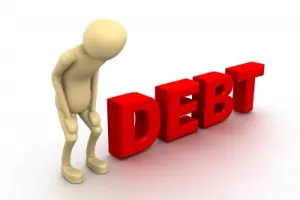Here is my post on debt cash-flow and the good life!
Please note: this post contains affiliate links. As an affiliate of Tangerine, this blog receives a small commission for each sign up.
It’s no secret that record low interest rates have sparked one of the largest debt binges in history. Year after year, studies show that people are getting more and more in debt and that this trend won’t change anytime soon.
Last week a report by the Canadian Payroll Association mentioned that half of all Canadians live paycheck to paycheck and those people would face hard times if their pay were delayed by just one week! Nearly 25% said they would be hard pressed to cough up 2k in an emergency, while 40% say they spend all or more than their net pay!
This week, the credit agency Transunion reported that if interest rates rise by 1% almost 1 million people would be hard up to make ends meet and service their debt. Raise rates by even a mere 0.25% and 718k people would face a personal financial crisis.
Is Debt Really The Big Problem or Is It Cash Flow?
What’s the big problem here? Most people will see the obvious and say that it’s that dirty little four-letter word, D-E-B-T, and the fact that people simply have too much of it. But another, equally important, problem is that most people lack any kind of cash flow beyond their bi-weekly paycheck.
After all, having debt isn’t really an issue if you have the cash flow to cover it along with the other monthly expenses. The real problem as I see it is that record low interest rates over the past 8 years have sent our society on a huge spending binge where people have spent big on things like houses, vehicles and a bunch of other “stuff” that doesn’t put money into their pockets. That’s what “bad” debt is. Those items don’t produce any extra monthly cash flow; instead they’re added expenses that drain away monthly cash flow.
People Should Be Buying Income Generating Assets Not Houses
My advice to people is to not follow the herd and keep piling on additional “bad” debt because, sooner or later, rising interest rates will come back to bite you. Rather, consider paying down some of that debt so you won’t be over exposed when interest rates rise. If you’re in a cash crunch, you have 2 choices: cut expenses or make more money. Once you’re in a decent financial position consider using debt to increase your monthly cash flow by investing in income generating assets.
Remember that good debt is used to buy assets that pay you every month. Things like dividend stocks, real-estate investment trusts (REITs) and rental properties. Increasing the monthly cash flow is what financial freedom is really about so that’s why I focus on buying assets that pay me every month.
I haven’t had a pay raise from my job in years but my dividend stocks give me raises at least once a year and my rentals should at least keep pace with inflation.
A Good Job is Not Enough Anymore…We Need to Create Passive Income
Like most people, I used to think that the key to the good life was simply getting a good paying job. Get a good job, buy a house and for the rest of your working life pay down debt and build up savings to retire. That’s what we’re taught and that’s the path that most people follow and that’s precisely why most people can’t stomach a measly 0.25% rate increase and why they can’t pay the bills on time if their pay was delayed.
Now more than ever, I think the key is to own assets that pay a regular income. Not only do they add to the monthly cash flow, but they also provide some level of financial security in the event that I lose my job or I have unexpected monthly expenses etc. As I wrote in an earlier post, my approach has been to grow my assets and my income over time.
The funny thing is, is that no one ever told me to buy dividend stocks or rental units or anything else that adds extra money to the monthly budget and positively affects my financial well-being. Instead, society teaches us to buy expensive houses and cars and big screen TVs – all things that eat up a large portion of the monthly cash flow and, in the case of vehicles and gadgets, negatively impact someone’s financial well-being.
Finding the Right Balance is key to Managing Debt Cash-Flow and the Good Life
We need to be able to manage the debt side of our finances and the cash flow side from our jobs and from our investments. The debt side should always be decreasing, while the cash flow side should always be increasing. For all those suffering under the burden of debt and the daily grind, it’s important to remember that it’s never too late to start building wealth and you can do it for as little as $25 a month!
If you’re a little bit weary of the stock market then you should take a bit of time to do some research about investing. In the meantime, consider a High Interest Savings Account from Tangerine: More Is Always Better Become A Client And Earn Triple Interest Of 2.40% For Six Months!
Thanks for reading my post on debt cash-flow and the good life. If you’ve enjoyed reading this, check out my other posts on building wealth and growing passive income sources:
5 Steps to Growing Your Wealth
Why I Keep Growing My Passive Income
Photo Credit: Photo by renjith krishnan/Freedigitalphotos.net


MillionaireorMediocre
Wednesday 14th of September 2016
Absolutely agree with you! Love your blog by the way. Been reading it for a while, finally decided to comment.. They say cash is king, but I beg to differ. CASH FLOW IS KING! Cash are the little minions that build the empire (my video gamer is coming out of me lol).
Keep pushing! All the best.
MM
GenXinvestor
Wednesday 14th of September 2016
Thanks for the comment MM and glad you enjoy the blog! I really feel like a lot of personal finance advice focuses a bit too much on paying down debt and building up savings. Not enough attention is given to the dimension of cash flow which, to my mind, is really the underlying problem most people have with their finances.
Take care, GenXinvestor